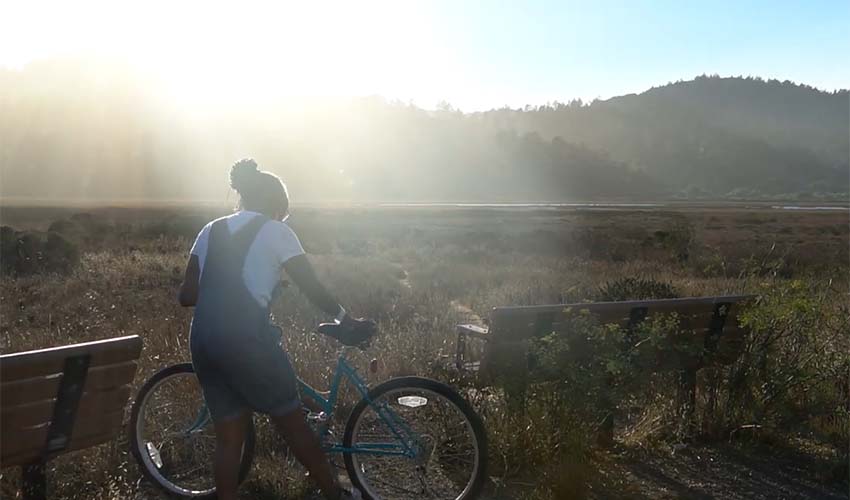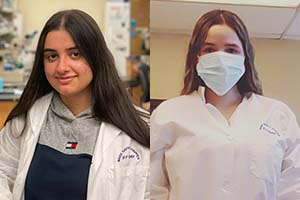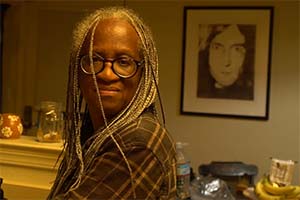SF State hosts 36th annual CSU-wide student research competition

A still of Jean Jones riding her bike in Marin from Alexander Whittlesey's film "Do You Live Here?" Image courtesy of Alexander Whittlesey.
The two-day event celebrated undergraduate and graduate research, scholarship and creative works
San Francisco State University virtually hosted the 36th California State University (CSU) Student Research Competition April 29 – 30. The annual event, held at a different CSU campus each year, was a celebration of student research throughout the CSU system. This was the first year San Francisco State hosted the event.
Two projects (three students) from SF State won prizes this year: graduate students Jane Clare Vosteen and Kristen Corsaro won first place in the graduate section of the health, nutrition and clinical sciences category; and Wesley Mariscal was the second-place winner in the undergraduate section of humanities, arts and letters category.
During the event, 221 students from all 23 CSU campuses convened on Zoom to present 181 projects showcasing their research, scholarship and creative works. Student projects were organized into 10 categories: behavioral, social science and public health; biological and agricultural sciences; business, economics and hospitality management; creative arts and design; education; engineering and computer science; health, nutrition and clinical sciences; humanities and letters; physical and mathematical sciences; and interdisciplinary.
For each project, students presented an eight-minute presentation followed by five minutes of questions and answers with this year’s judges. First- and second-place winners in both undergraduate and graduate divisions of each category won cash awards.
Each CSU campus has its own procedures for selecting up to 10 student delegates for the systemwide competition. At SF State, 54 students participated in a campuswide research competition at the end of February, a record high for the competition in the last five years. Ten first- and second-place projects moved on to the CSU competition.
“We have fantastic students doing important work, and this is a chance for them to showcase all the wonderful things they do,” said SF State Associate Vice President of Research and Sponsored Programs Michael Scott. Participating in research not only helps train students for the future, he explained, but gives them a deeper connection to the University and their own interests.
More than just a science major

Undergraduates Zainab Rizik and Nicole Bañuelos
SF State’s research community includes students like Nicole Bañuelos and Zainab Rizik, the University’s undergraduate delegates in the biological and agricultural research category. The duo uses Drosophila melanogaster (fruit flies) to study the lethality of parabens on cancer-related mutations. They’ve been working in Biology Professor Blake Riggs’ lab for a little over a year and are surprised by the level of autonomy they’ve been given.
“I was really surprised, but I’m glad. I love the independence,” said Rizik, a junior in Biology who is graduating this spring. “I love being able to really show my skill and my passion for science.”
As Genentech Foundation scholars, Rizik and Bañuelos credit the program for helping them not only work in lab but also support them financially so that they can devote time to their research. The program is one of many on campus designed to help and support students interested in research. And thanks to the program and their faculty mentor, Rizik and Bañuelos have already attended several scientific conferences and competitions, regularly networking with faculty, graduate students and postdoctoral fellows.
“Being immersed in a community of other scientists, I think it helps develop you as a scientist,” said Bañuelos, a junior in Cell and Molecular Biology who transferred from community college. “Before joining the Riggs lab, I didn’t necessarily see myself as a scientist. I saw myself as a science major.”
“You’ve got to give yourself a shot”
Alexander Whittlesey, the University’s graduate student delegate in the creative arts and design category of the CSU competition, says the community at SF State is unlike anything he’s experienced at other universities.
“It is smaller and it feels like you’re getting people that really want to help build you up and really want to help you develop and go where you want to go,” he said.

Still of Jean Jones from Whittlesey's film
Whittlesey works closely with homeless populations in the Bay Area while going to school part-time. The graduate student in Broadcast and Electronic Communication Arts (BECA) says he is fascinated by housing, space and individuals’ relationship to both. His 19-minute documentary “Do You Live Here?” follows Jean Jones, a writer and cancer survivor, as she talks about her life, her brush with homelessness and her experience as a Black woman who’s lived in Marin County for most of her life. She is also Whittlesey’s mother.
“The finished product is kind of a reflection of letting her guide her own story and show us what she’s comfortable revealing and what is accurate and also representative of her,” Whittlesey explained.
Originally, Whittlesey wasn’t even sure his project would fit the research competition so he was surprised he did so well at the SF State-level event. Not only were the judges complimentary, but he found that their constructive feedback helped him understand how to reframe his film as scholarly research. He advises future students to remember the importance of sharing their work.
“I would just recommend what the head of our department [Professor Melissa Camacho] always says,” he shared. “If you see any competition or any opportunity that remotely has some room for your work, just throw yourself in there. You gotta enter. You’ve got to give yourself a shot.”